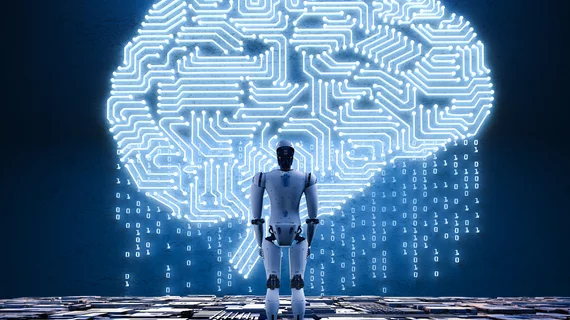AI saves radiologists time by triaging chest x-rays, but is it clinically feasible?
There’s been plenty of hype around the potential of artificial intelligence (AI) to ease radiology workloads. And a new convolutional neural network approach detailed in a Jan. 22 Radiology study greatly reduced reporting backlog by accurately triaging chest x-rays in real-time.
"The initial results reported here are exciting as they demonstrate that an AI system can be successfully trained using a very large database of routinely acquired radiologic data," said co-author Giovanni Montana, PhD, of the University of Warwick in Coventry, England, in a prepared statement. "With further clinical validation, this technology is expected to reduce a radiologist's workload by a significant amount by detecting all the normal exams so more time can be spent on those requiring more attention."
The team used more than 470,000 de-identified adult chest x-rays to develop their AI platform. A natural language processing (NLP) algorithm analyzed the radiology reports to mark the image as either critical, non-urgent or normal—a “critical milestone” in the study, Montana noted.
After testing the system on an independent set of 15,887 images, they reported the platform detected normal chest x-rays with a sensitivity of 71 percent, specificity of 95 percent, positive predictive value of 73 percent and negative predictive value of 99 percent.
After simulations, Montana and colleagues reported critical findings received a radiologist opinion in 2.7 days, on average, much quicker than the 11.2 day average for a real-world practice. For urgent findings, average reporting was reduced to 4.1 days, down from 7.6 days.
There were a number of limitations cited by the study authors. In a related editorial, William F. Auffermann, MD, PhD, with University of Utah Health in Salt Lake City, took issue with the team’s use of data from a single health system. Auffermann argued that an algorithm trained with data from one institution may not translate well in other centers.
A study published Nov. 6, 2018 in PLOS Medicine tested this notion, and found algorithms trained to detect pneumonia on chest x-rays performed poorly when tested on data from another health system.
Auffermann did note the system described in the study could have a “substantial” impact on decreasing turnaround times if used in a clinical setting, but emphasized more testing is needed before that becomes a reality.
“One may imagine a future AI triage system where the patient is held briefly in the radiology department while an AI algorithm performs a rapid initial triage for critical findings before the patient leaves the department,” Auffermann concluded. “The exact manner in which such a system may be implemented will require further study before it is ready to assist in patient care.”

